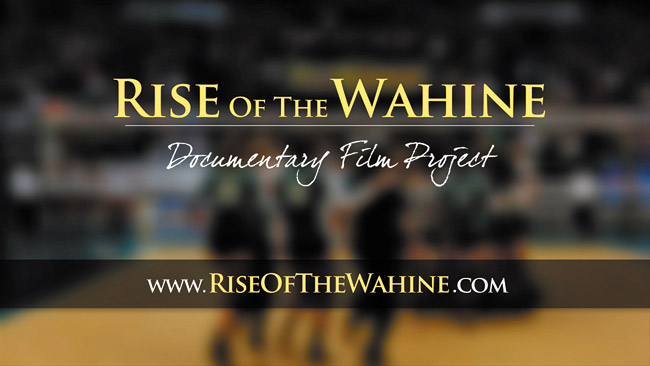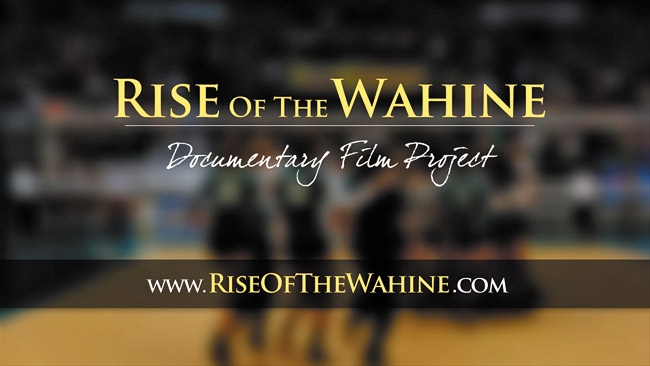Rise Of The Wahine
Producers of a documentary about the early days of UH Rainbow Wahine volleyball hope to raise funds to offset its costs through Indiegogo
Not so long ago – a mere generation – women’s athletics was drastically different.
Even after the passage of Title IX in 1972, coauthored by Hawaii’s U.S. Rep. Patsy T. Mink, change was gradual.
In a TV interview a few years after Title IX, former Rainbow Wahine Beth McLachlin was asked if she wished she were a boy.
“If the camera wasn’t rolling, I probably would have decked him,” she says.
Stories like these, and McLachlin herself, inspired Oahu-born-and-raised Dean Kaneshiro to create and direct Rise of the Wahine, a historical sports documentary scheduled to be released next summer.
With a focus on University of Hawaii at Manoa’s first Rainbow Wahine volleyball team, Kaneshiro has been working closely with local producer Ryan Kalei Tsuji, as well as Los Angeles-based producer Tiffany Taylor. Interviews with key players, including Pat Saiki, Dave Shoji and Mink’s daughter Wendy, weave a vivid narrative of a history that many may never have heard.
Of course, today the Rainbow Wahine attract loyal fans to Stan Sheriff Center equipped with bedazzled signs and gifts for players. Kaneshiro hopes to unveil a history that evokes a greater appreciation among fans.
The project began three years ago when Kaneshiro was helping a friend interview McLachlin. Admittedly unable to relate to her, he was moved to dig deeper into the story.
“I’ve never heard anything so inspirational, local, right in my back yard,” he says.
Kaneshiro likens the research they’ve done to a scene straight from an Indiana Jones film. As he and Tsuji continue to delve deeper into the story, they have uncovered truths of which they previously were unaware.
This was especially eye-opening for Tsuji, who has worked with the Rainbow Wahine volleyball team and currently provides commentary for the sport on OCSports.
“For someone who has been around in the program, who has grown up watching it, for me to not even know a lot of these things was a wake-up call that this is something that everyone needs to know,” he says.
It is a reaction they expect will be similar for viewers. Without pioneers such as Dr. Donnis Thompson, women’s volleyball at the university never may have blossomed. It was Thompson, who, in 1972 after being appointed the first female athletics director for UH, introduced track and field and volleyball as the first sports available to female athletes.
“She is someone who’s played such a pivotal role in Hawaii athletics, and yet she has a statue that’s hidden in the beer garden at Stan Sheriff Center,” says Tsuji.
The irony of two men working on a film about the struggles of women has not been lost on those with whom they have interacted. But with an 8-year-old daughter of his own, Kaneshiro hopes it encourages other men to gain a deeper understanding of a topic that still is contemporary.
“I want to see men hear these stories, listen and get a great understanding in their hearts,” he says, “because you can share your gymnasium with a woman, you can vote for a woman president, but you know what? That doesn’t mean, as a guy, that you truly, honestly, in your heart, value a woman.”
At a time when the dissemination of information relies heavily on media, Kaneshiro hopes the story of these game-changers enriches the lives of a younger generation – those who may love the sport but have no knowledge of its lineage.
“If any generation needs that now, it’s ours,” says Kaneshiro.
“It’s a story that should not only be known in Hawaii, but nationwide,” says Marilyn Moniz-Kaho’ohanohano. A member of the university’s first women’s volleyball team and current assistant athletics director at UH, she has seen the department’s progress throughout the years. Now, she says, the university has more than doubled its number of female participants.
To offset the costs of production, an Indiegogo campaign online currently is accepting donations through December via https://www.indiegogo.com/projects/rise-of-the-wahine. Donations also may be mailed to 820 W. Hind Drive #240178, Honolulu, HI 96824.
Kaneshiro also is seeking the public’s help with any photos and relevant stories they may have to share. This is especially crucial for information related to Thompson, whom he says is somewhat of an enigma.
At the end of the day, Kaneshiro’s main goal is to pay his respects.
“I think this is a way that we can honor our mothers and fathers, so to speak, and this is a way we can tell their story,” he says.
For more information, visit riseofthewahine.com, call 323-696-1775 or email riseofthewahine@gmail.com.







